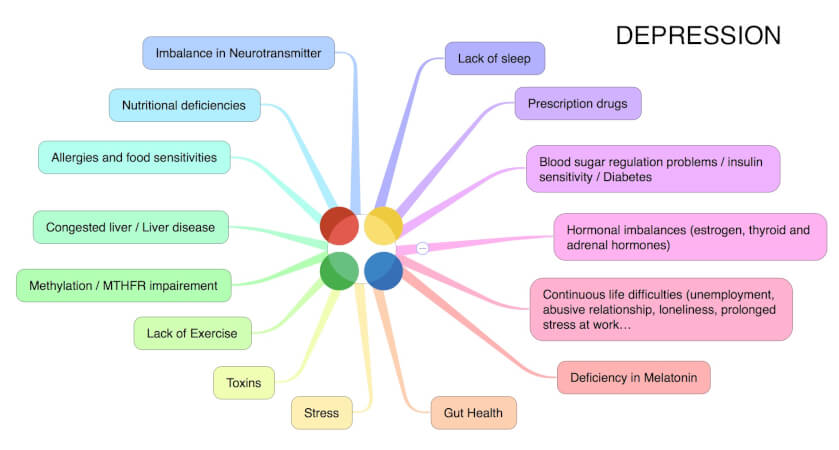Physical factors in depression

Depression can be caused or exacerbated by a number of physical factors. It can be so hard to take care of ourselves when we are feeling low, and exhausted from taking care of a baby, but health, diet and lifestyle can play a significant part in our self of well being.
THYROID DISORDER
The thyroid gland is situated in the neck and controls many of our body’s functions and processes. Depression is often a symptom of a low-functioning thyroid and the doctor may perform tests that can reveal if you have underlying imbalances which may manifest as depressive or other mental symptoms. The website Thyroid UK gives guidance on how to request them: thyroiduk.org.uk/tuk/diagnosis/getting_diagnosis.html British Thyroid Foundation has useful information: www.btf-thyroid.org
CHRONIC STRESS
On going chronic stress affects our body’s adrenal glands (which are located near our kidneys) causing them to oversecrete the hormone cortisol. In relation to depression, cortisol lowers our serotonin levels (which is our natural ‘feel good’ neurotransmitter). www.nhs.uk/conditions/stress
LACKING NUTRIENTS
Many people who suffer from depression are deficient in B-complex vitamins, vitamin C, D, zinc, magnesium, folate and selenium. A simple vitamin and mineral supplement may be useful or ask your doctor if you could be referred to the dietician.
LACKING OMEGA-3
Omega-3 essential fatty acids (especially EPA: Eicosapentaenoic acid and DHA: Docosahexaenoic acid) are very important to brain health and help the brain to work efficiently as well as helping to balance our moods.
IRON DEFICIENCY ANAEMIA
Being low in iron, which causes us to be anaemic and feel overwhelmed with tiredness, dizziness and to suffer with headaches, may also trigger our feelings of low mood and hopelessness.
YEAST
Yeast (also known as candida or thrush) can contribute towards depression in two ways: It reduces the absorption of nutrients, in particular the B vitamins, that are important for the health of our nervous system; It suppresses the intestines’ production of serotonin (our feel good hormone) As over 90% of the body’s serotonin production takes place in our intestines, candida or thrush can have a huge effect on our moods. A healthy gut may be encouraged with probiotic supplementation.
Take a free online health check: www.patrickholford.com